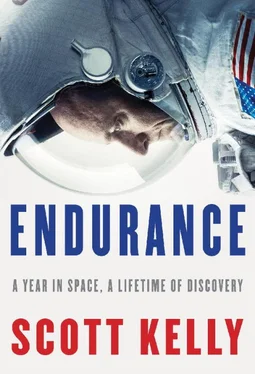“Tell me how you’re doing, Dad,” Charlotte says. She suddenly seems to be giving me her full attention, speaking to me in a more adult tone.
I tell her about the power failure last night and how we dealt with it. She sounds interested and asks questions. I tell her more about my new crewmates and how they’re settling in. I tell her about some of the experiments I’ve been working on and about how the clouds and airplane contrails over Europe looked while I was drinking my morning coffee. By the time we get off the phone, I feel as though I’ve observed a milestone of growth in Charlotte, like watching her take her first step or say her first word. She seems as though she’s matured by years within the space of a short phone call. It’s another milestone I’ve spent away from Earth.
—
ON THE WEEKENDS, I don’t set an alarm, letting myself wake up naturally, maybe an hour later than usual. One Sunday morning in mid-August as I’m slowly waking up, I start to become aware of a welcome sound I haven’t heard for many years. Maybe I’m dreaming about the weekend mornings when I was growing up in New Jersey, when the bagpipers would play at the nearby high school football field. The sound would drift into my room and wake me in a pleasant way, unlike the sounds of my parents fighting that sometimes woke me in the night.
Fully awake, I know I’m in my sleeping bag in my CQ, not in my childhood bed on Greenwood Avenue. But I’m still sure that I’m hearing bagpipes: “Amazing Grace.” I make my way out of Node 2 and follow the sound to find an unexpected sight: Kjell floating at the far end of the Japanese module, playing the bagpipes. Astronauts have been bringing instruments to space for decades—at least as far back as 1965, when astronauts played “Jingle Bells” on the harmonica. As far as I know, Kjell is the first bagpiper in space.
“Sorry, did I wake you?” says Kjell.
“No, it’s great,” I said. “Play anytime you like.”
Today, Gennady, Misha, and I are moving a Soyuz, the one Gennady will go home in, to the aft of ISS in a complex shell game designed to most efficiently utilize the docking ports. Gennady could move the Soyuz by himself, but Misha and I must come along for the ride because this Soyuz is our lifeboat, and once it undocks it’s never guaranteed we will be able to get back aboard the station.
On Earth, moving the Soyuz would be as simple as reparking a car. Up here, as we get into our Sokol suits, we jokingly refer to this brief journey as our summer vacation away from the ISS. Even though we are only away from the station for twenty-five minutes, the whole procedure takes several hours with all of the preparations. As the right seater, I don’t have much to do, so I bring my iPod to listen to my classical music playlist including Mozart, Beethoven, Tchaikovsky, Strauss, and Samuel Barber’s Adagio for Strings. I had almost forgotten how uncomfortable this position is on my knees—I’m not looking forward to doing this again seven months from now when we leave the station for the last time.
When we push away from the station and start the fly-around, I find it strange to see the station from the outside again. It’s been five months since I’ve been outside. Even though it’s in jest that we’ve been calling this our “vacay,” it is actually good to get away. And like earthbound vacations, this one feels too short and leaves me somehow feeling more tired than when I left.
11

ONE AFTERNOON in early 1995, I was in my cubicle at the test squadron, in a trailer adjacent to a row of World War II–era hangars and the flight line where F-14 Tomcats and F/A-18 Hornets sat idle ready for flight, when I noticed that one of my colleagues had a big stack of papers on his desk. I asked him what he was doing.
“I’m filling out my astronaut application,” he said.
Of course, I had been aiming to fill out an astronaut application someday, but I’d assumed I wasn’t ready yet, that I wouldn’t be for another ten years or so. I was only a little more than a year out of test pilot school, just thirty-one years old, a bit on the young and inexperienced side for a pilot astronaut. I also didn’t have a master’s degree yet, which I thought was a requirement. But I asked my colleague whether I could take a look at his application. I was curious about what was involved, and I was especially curious about why his stack of papers was so thick. When I paged through it, I saw that NASA was looking for a lot of the kinds of information you would expect: transcripts, letters of recommendation, a detailed list of job responsibilities to date. I also noticed that he had included everything he had ever done in his life. This guy was one of the best qualified among us.
Looking over his application, I had an idea: Why not apply and be rejected? It would give me the opportunity to find out what the process was like, and rejection wouldn’t harm my chances in the future. I decided to take a different approach from what my colleague had done. I would include only what seemed really important. If my application was brief and concise, maybe the person reading it could take in all the information and be left with a clear sense of who I was. This minimalist approach was also appealing to me because the deadline was fast approaching.
I filled out the application for federal employment and submitted it on time. Months later, my colleague whose application I had first seen shared the news that he’d been called for an interview with NASA, in the first week of interviews. The conventional wisdom at the time was that NASA called their top choices first, and those interviewed in the first round had by far the best chance of being selected. I congratulated him and figured I would never hear anything.
A few weeks later, Mark and his wife were having dinner with Leslie and me at our house. Halfway through the meal, Mark announced that he had also been called for an astronaut interview.
“That’s awesome, congratulations,” I said. And I meant it. I felt he truly deserved it. He was clearly more qualified than I was, with his master’s degree in aeronautical engineering. I decided not to mention that I had applied too, because I figured I wouldn’t get an interview anyway, and I didn’t want my not getting called to take attention away from his accomplishment.
“I do have a favor to ask you,” Mark said. “Do you have a suit I could borrow?”
I did—I had just bought a suit to attend a friend’s wedding—so I loaned it to him.
Months later, I came back to the office after flying a test flight and my secretary flagged me down. “Hey, Scott,” she said excitedly. “You missed a phone call from Teresa Gomez at NASA.” Teresa was the long-serving administrative assistant at the astronaut selection office. Her name was widely known throughout the flight-test community; if you got a call from her during the interview process, it was probably good news.
I called back right away, and Teresa asked whether I wanted to come down for an interview. “Yes! Of course,” I answered, trying not to shout. “I can come whenever you want.”
My interview was scheduled for a couple of weeks later. In the meantime, Mark came back from his own interview feeling that he had done well. He filled me in on exactly what to expect, which was hugely helpful. With Mark’s information, I could think about how I would deal with each stage of the daunting process and what answers I might give in the interview. Along with Dave Brown, a fellow Navy pilot who had also interviewed with NASA in the first group, we set up a camera in a conference room at the test pilot school in the evenings to videotape our sessions. Mark and Dave asked me the same questions the committee had asked them, I gave my answers, then we critiqued the video together. “Lean forward more,” Dave urged me. “Be more animated.” It not only helped me enormously, but it was a pretty nice thing for them to do, considering that we were in competition.
Читать дальше













